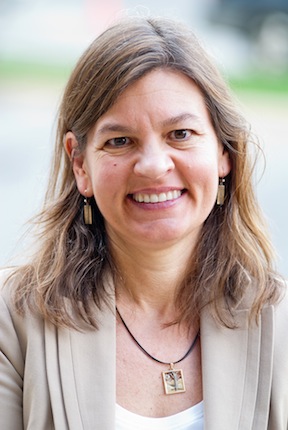The full seven-member Buncombe County Board of Commissioners held its first meeting since the election on Feb. 5, setting the stage for how they will conduct business for the rest of the year.
The board unanimously appointed Democrat Holly Jones to serve for a year as its vice chair. Historically the post has largely been ceremonial, with duties mostly limited to presiding over meetings when the chair is absent. However, the job does pay more: Regular commissioners earn $26,475 per year and the vice chair makes $30,732 (the chairmanship pays $34,989).
In the weeks leading up to the meeting, Republican Joe Belcher lobbied his colleagues to appoint him to the position, but no one ended up nominating him. With the board narrowly split between four Democrats and three Republicans, Belcher had argued that he could help bring a sense of bipartisan accord. However, Jones is the only member of the board other than Chairman David Gantt who has previous experience as a commissioner, and she argued that experience would make her the best candidate.
There was little discussion of the matter at the Feb. 5 meeting as everyone lined up behind Jones.
The Buncombe County commissioners also made some big changes to their own rules and procedures. Previously, County Manager Wanda Greene had authority over what issues were included in the meeting agendas for the board’s consideration. Commissioners unanimously voted Feb. 5 to give Gantt the authority to put issues on the agenda without Greene’s consent (she was absent from the meeting due to illness). The other commissioners agreed that they would need the support of two additional board members to place an item on the agenda.
In addition, the board unanimously voted to move public-comment sessions to the beginning of meetings rather than at the end. Before making the decision, Gantt asked for a show of hands of attendees to see what they’d prefer. Most indicated that they wanted public comment sessions both at the beginning and at the end of meetings. No one raised their hands to show support for having them at the beginning only.
However, Belcher argued that there were advantages for the public to holding them before votes on contentious issues. “I thought it would be good for the public to speak prior to the things we discuss, so that they would have input,” he said. He added, “This gives them the option to go ahead and leave if they don’t want to sit here” for the rest of the meeting.
Gantt said he thinks there’s advantages and disadvantages either way, noting: “I see both sides, and both sides are valid.”
However, Jerry Rice, a Candler resident who is a regular speaker during such public comment sessions, gave the commissioners an earful for not expanding them to both sides of the meetings.
“The voters put you in here and they need a voice,” he asserted. “The county is trying to shut us up and shut us down.”
Zoning delay
In other business, the commissioners voted 6–1 to delay the zoning of 16 acres of plots adjacent to the Asheville Regional Airport until October 1. The land was previously under city zoning, but state law transferred zoning jurisdiction to the county last year. Since then, the land has been some of the only property in the county without zoning designation, worrying airport officials that it could be prone to development that’s incompatible with the area.
However, longtime influential local developer Mike Summey pushed the commissioners not to zone a 3.5 acre parcel he owns. Summey, who co-founded the Council of Independent Business Owners, told them that he’s had tentative plans to build a 140-foot-high multi-use development on the property for several years and is concerned that zoning could hurt his ability to bring the project to fruition. Commissioners hailed the development plans, which Summey said were stalled due to the sluggish economy, but were divided about the fairness of allowing the land not to be zoned.
“We have countywide zoning and it applies to every other property,” noted Commissioner Brownie Newman. But he added that he didn’t want to put any undue burdens on Summey’s project, saying: “I’ve definitely got mixed feelings about it tonight.”
Meanwhile, County Planning Director Jon Creighton reminded the commissioners that the planning department unanimously recommended zoning the land to a Employment District designation and warned that without zoning, Summey could conceivably sell the land and it could be developed in to something incompatible like a smokestack operation.
But Commissioner Mike Fryar, a longtime zoning opponent was unfazed, arguing: “When this total county wasn’t zoned not that long ago, it wasn’t a problem.”
After a lengthy discussion, the commissioners opted to delay the zoning, with Newman maintaining, “It’s ok to take our time to make sure we get it right.”
Frost cast the lone vote against the delay, questioning the fairness of acting on Summey’s request when other developers have had to conform to zoning rules for several years.
“If everything else in Buncombe County is zoned, I think it’s pretty tough to make an exception because somebody had a plan,” she said.
This was Frost’s first meeting serving as a commissioner due to a series of disputes over the election results by her District 2 opponent, Christina Kelley G. Merrill.





Before you comment
The comments section is here to provide a platform for civil dialogue on the issues we face together as a local community. Xpress is committed to offering this platform for all voices, but when the tone of the discussion gets nasty or strays off topic, we believe many people choose not to participate. Xpress editors are determined to moderate comments to ensure a constructive interchange is maintained. All comments judged not to be in keeping with the spirit of civil discourse will be removed and repeat violators will be banned. See here for our terms of service. Thank you for being part of this effort to promote respectful discussion.